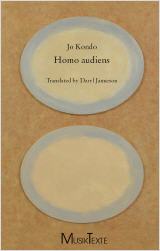Jo Kondo: Homo audiens
and The art of being ambiguous
Translated by Daryl Jamieson
124 pp., hardback
“Composing, in the end, is ‘listening’, and through ‘listening’ opens the Self to the external, to the Other.” (from chapter 2)
Jo Kondo – one of Japan’s most celebrated living composers – sets out his conception of music as a ‘shared object of listening’, an ultimately hopeful vision of music as a purposeless – non-instrumentalised – activity that brings together composers, performers, and audiences as equal partners in the shared creativity of listening. At once an exploration and critique of the aesthetics of absolute music from German Romanticism to the present day as well as an argument for diversity in both interpretation for its own sake and as a reflection of our polystylistic society, this is also one composer’s reflections on music that has affected him, from Beethoven’s Symphony No. 9 to John Cage’s 4’33”. In essence, homo audiens is a book about the primacy and importance of listening in all musical activity.
In addition to the main text (a translation of Kiku hito, published in 2013), the two appendices present essays from earlier in Kondo’s career, providing background to the main text and addressing Kondo’s own compositional practice. The translator’s preface (which can be previewed here) sets out a brief biographical sketch of Kondo which situates his work in relation to his life, influences, and collaborators.
TOC

